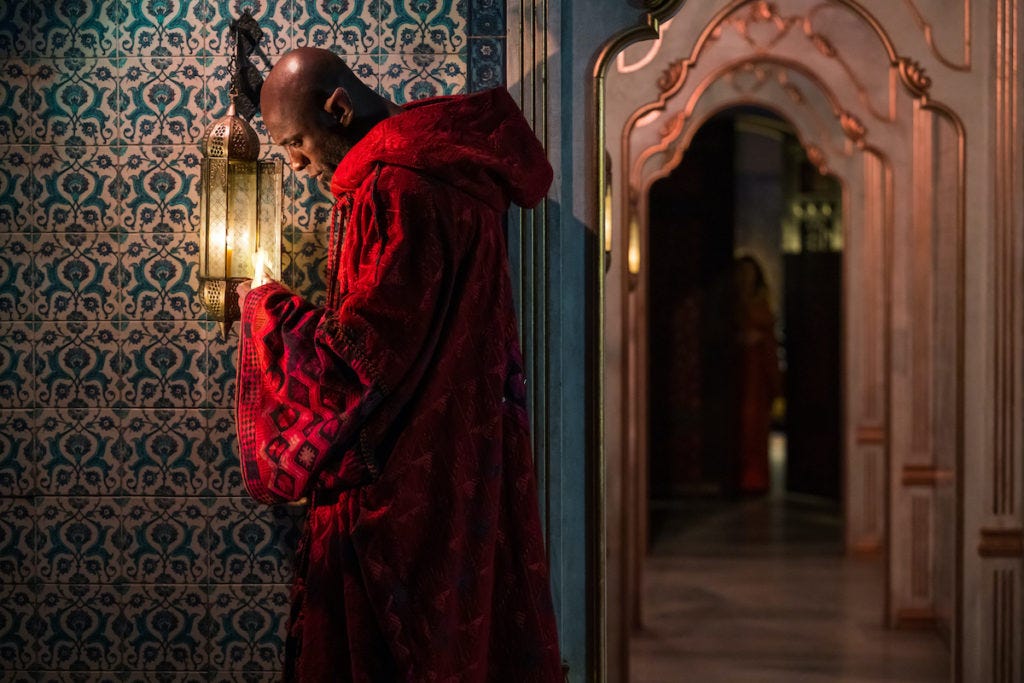‘Three Thousand Years of Longing’ Review
A story about stories.
George Miller’s long-awaited followup to Mad Max: Fury Road is a story about stories, a sort of meta-story, one that asks us to question the very role of stories in society. Centered on Alithea (Tilda Swinton), a student and teacher of narratology (real word), and her discovery of a wish-granting Djinn (Idris Elba) desirous of his own freedom, Three Thousand Years of Longing deploys a series of nested stories to tell its tale.
The short explanation is that the Djinn informs the narratologist that Djinns love narratives, that the magical beings need them like air, they trade them like currency. And so, as he tries to convince Alithea to make the required number of wishes to set him free, he uses narratives to explain to the woman how he came to be in her possession, working his way through the centuries right up until he popped into her hotel room—notably, the very one occupied by Agatha Christie as she wrote Murder on the Orient Express, one of the more important meta-narratives of our time.
His journey through time is one of desire. A desire for love, yes, but also for understanding, for companionship, for freedom. Alithea is wise enough to know that there are few narratives devoted to the deployment of wishes that do not end with someone getting their comeuppance. But does self-awareness negate the cautionary aspect of all such tales? If you know that a wish will end tragically can you avert the tragedy? Has postmodernism freed the genie from his lamp altogether and let those who wield him carve their own path through the world?
Perhaps; perhaps not. Again, this is a story about stories, a kissing cousin of the dread movie about movies. But then, I’ve always been a sucker for such stories and such movies because, in the end, what am I doing here if not trying to discern why and how a story wields power, how it transcends words on a page and images on a screen to become something larger and more resonant—or why it fails to do just that.

As such, here is what I’ll say: the power of Three Thousand Years of Longing depends firmly upon your ability to subsume yourself to its level, its vibes. Can you give yourself over to a story that hops from the Song of Solomon—replete with mythical creatures and instruments alike—right up to the Large Hadron Collider’s unraveling of the mysteries of the universe in an effort to draw similarities between the hubris and desire of individuals across millennia? Will a minotaur’s horns or the suggestion of sentient electromagnetic waves make you snigger in equal measure?
If so, this might not be the movie for you.
But Three Thousand Years of Longing works, I think, because it examines a very fundamental premise, the idea that “We exist only if we are real to others,” as the Djinn puts it. Man is not a solitary creature; one hundred years of solitude and three thousand years of longing aren’t so different, really, particularly in the hands of an adept magical realist. It is only in understanding each other—in seeing ourselves in each other’s stories—that we can ourselves be whole. Miller draws visual parallels between Alithea and the women from the stories the Djinn tells: she swallows her desire like Sheba before her; she reads manuscripts with her fingers racing down the page like Zefir, a wife whose genius goes ignored by the world.
The movie hinges on the performances of Swinton and Elba, given that we spend much of our time with them, largely locked up together in a hotel room. (This is an epic that spans centuries and yet, oddly, reflects a very specific, very limited time, that of COVID-related filming restrictions.) They are delicate performances: Elba does world-weary better than just about anyone, while Swinton hides an innate sadness just beneath a brash exterior. There have been mutterings about the racial dynamics at play here; all I’ll say is that I’d pay cash-money to see a white critic deploy the term “magical negro” in a face-to-face conversation with Elba.
I would be mildly surprised if Three Thousand Years of Longing finds a huge audience on initial release; it feels like the sort of movie that needs time to breathe and grow. But I, in turn, feel like it’s a knockout, a story that will in due time join the pantheon of stories about stories.



